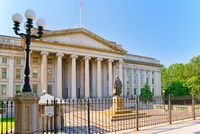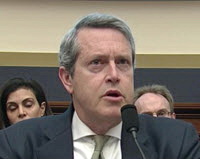The Real Estate Roundtable yesterday asked the U.S. Treasury Department and IRS to reduce the risk of market disruption by clarifying the tax treatment of financial contracts that replace the expiring London Inter-bank Offered Rate (LIBOR) with a substitute reference rate. Over $200 trillion of LIBOR contracts are outstanding, including roughly $1.3 trillion of commercial real estate debt. (Roundtable LIBOR letter, June 6)
 |
The Real Estate Roundtable yesterday asked the U.S. Treasury Department and IRS to reduce the risk of market disruption by clarifying the tax treatment of financial contracts that replace the expiring London Inter-bank Offered Rate (LIBOR) with a substitute reference rate. (Roundtable LIBOR letter, June 6). |
- The United Kingdom's Financial Conduct Authority (FCA), which regulates LIBOR, announced in 2017 that it is phasing out the global borrowing index by the end of 2021. LIBOR will need to be replaced in both new agreements and innumerable existing legacy contracts.
- Several factors may necessitate or accelerate parties' adoption of alternative reference rates on existing contracts well before the end of 2021. To facilitate the transition, the Federal Reserve Bank of New York in 2018 began publishing an alternative U.S. benchmark to work alongside LIBOR – the Secured Overnight Financing Rate (SOFR). (See: A User's Guide to SOFR and SOFR: A Year in Review)
- However, several issues may be contributing to the reluctance of market participants to use SOFR, including the absence of necessary internal infrastructure to support its accounting and trading, and the lack of tax guidance.
- Roundtable President and CEO Jeffrey DeBoer noted in the comment letter, "If the terms of a debt instrument are significantly modified, for Federal income tax purposes there is a deemed exchange of the old debt for a new (modified) debt instrument." Without relief, this deemed exchange could trigger the recognition of taxable gain or loss for the lender, or debt discharge income for the borrower.
- "Moreover, the tax consequences of the deemed exchange can arise without generating actual cash to pay any ensuing tax liability," wrote DeBoer.
 |
Randal Quarles – the Fed's vice chairman in charge of financial regulation – reiterated the urgency of moving forward on the transition to SOFR. |
- The Roundtable's June 6 comments recommend that a safe-harbor rule confirm that a replacement index or formula identified by regulators, broad industry groups, or similar objective sources-or by the parties themselves in good faith-is not considered an alteration or modification of the original instrument. The Roundtable letter states, "Instead, the replacement should be treated for Federal tax purposes as a continuation of the instrument's original terms."
- This week, Randal Quarles – the Fed's vice chairman in charge of financial regulation – reiterated the urgency of moving forward on the transition to SOFR: "I believe that the ARRC has chosen the most viable path forward and that most will benefit from following it, but regardless of how you choose to transition, beginning that transition now would be consistent with prudent risk management and the duty that you owe to your shareholders and clients .... With only two and a half years of further guaranteed stability for LIBOR, the transition should begin happening in earnest." (Bloomberg, June 3)
- The Wall Street Journal reported last July that companies were adopting SOFR sparingly – despite regulators urging banks and traders to stop launching new Libor-based contracts ahead of the 2021 deadline. (WSJ, July 12 and Roundtable Weekly, July 13, 2018)
The Roundtable letter was developed by a task force that included Tax Policy Advisory Committee (TPAC) Chairman Frank Creamer Jr., TPAC member Don Susswein, and chair of the Real Estate Capital Policy Advisory Committee (RECPAC) Working Group on LIBOR, Joseph Philip Forte. On June 11, at The Roundtable's Annual Meeting in Washington DC, Joseph Forte will lead a RECPAC discussion on real estate's concerns with the LIBOR transition.

